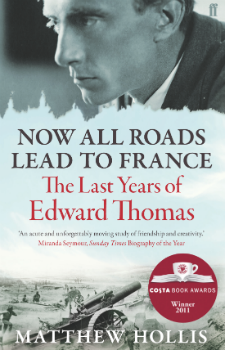
In this year, the 100th anniversary of World War I, a must-read book is Matthew Hollis’s
Now All Roads Lead to France – The Last Years of Edward Thomas.
Edward Thomas was a war poet and Hollis tells of the making and the dying of this writer who became so infused with the spirit of the land. This is no naïve, jingoistic or triumphalist story, either of Thomas, or of the wider maw of the Great War into which he was drawn. It is a slow awakening of an intelligent and razor-sharp mind to a deep sense of what he, Edward Thomas, would enlist for – the very earth of England itself.
Thomas was a nature-contemplative who regularly escaped the confines of a family life that restricted his independence and made emotional demands he found difficult to meet. Perhaps he was after someone who would appreciate his poet’s soul, something he found platonically elsewhere.
He earned his living through writing prose and book reviews, a seemingly endless churning of words he deeply resented. He was though a respected part of a remarkable literary landscape featuring many well-loved names and old and new movements within poetry, from the Georgian movement, the Dymock poets within that movement, and the Imagists. These names included Rupert Brooke, W.H. Davies, Walter de la Mare, T.S. Eliot, Robert Frost, John Masefield, Wilfred Owen, Ezra Pound, Siegfried Sassoon and W.B. Yeats.
In a satisfying attention to detail in what seems a largely man’s world, the author weaves in those women who wrote in this period, as well as those poets whose names no longer ring a bell. It was a world in which a poetry bookshop could thrive.
Thomas, who wrestled with depression for much of his life, who kept many who loved him at a distance, was also someone who inspired great love and friendship in return – most famously with Robert Frost, the great American poet. This friendship forms a central strand in this book. It is on such threads literary glory can rest, the encouragement of one person bringing out a hidden gift of poetry and even a new hold on life, such was Frost’s influence on Thomas the poet.
It was only from November 1914 that Thomas began to write poetry as if it were a calling, finding a hidden capacity that poured out like a deep spring. He was to die less than two and half years later, on 9 April 1917, in the first hour of the battle of Arras. The genesis of his poetic sensibility had been long in the making, and the finding of it was to bring him largely out of depression, into a creative space that was remarkable for its quality and awareness.
The story Hollis tells is emotionally wrenching and deeply moving. It is a beautifully crafted biography. That there is a long immersion in the subject here is clear, and a story more rounded for being slowly made. It has not been written, as much of Thomas’s prose was, in a hurry. Through it, as a reader, you are slowed down and able to simply be with the unfolding of a life that is compelling and fascinating. Perhaps the very heart of it lies in the shift from literary hack to poet, ‘Not a different man,’ said poetic soul and friend Eleanor Farjeon, ‘but the same man in a different key.’ Suddenly and briefly the man becomes a poet, and a lark ascending.
The narrative is not directly linear, within the inexorable, gravitational, almost circular pull of the war in France, which swallows Thomas and millions of others, Hollis takes us back to key scenes from Thomas’s early life. Again there is satisfying detail of the wider historical setting, and what it was like to live in England during this period.
As Thomas came late to his poetry, so do we in Hollis’s telling of it. But here the author’s own knowledge of the poetic craft and his subject illuminates with a clear and profound seeing of the poet’s craft and sensibility.
Thomas didn’t just write poetry, he formed a clear sense of what poetry was. The ‘thought-moments’ that knot Thomas’s poems together are mirrored in Hollis’s own prose. In the same way you might be drawn to read a poem again and again, so there are scenes, chapters and ‘thought-moments’ in the prose of the story that draw the reader in to a similar contemplation.
The book has been my constant companion for the last few weeks, and I am loathe to put it down – it has become a friend. It invites immersion, and is hard to resist. It casts a slow and subtle spell, drawing you out of the shadows of your own self. I was left marked by this book and its alchemy. The poet who was lost and found and then lost again in the trenches – can be re-found in the pages of this biography.